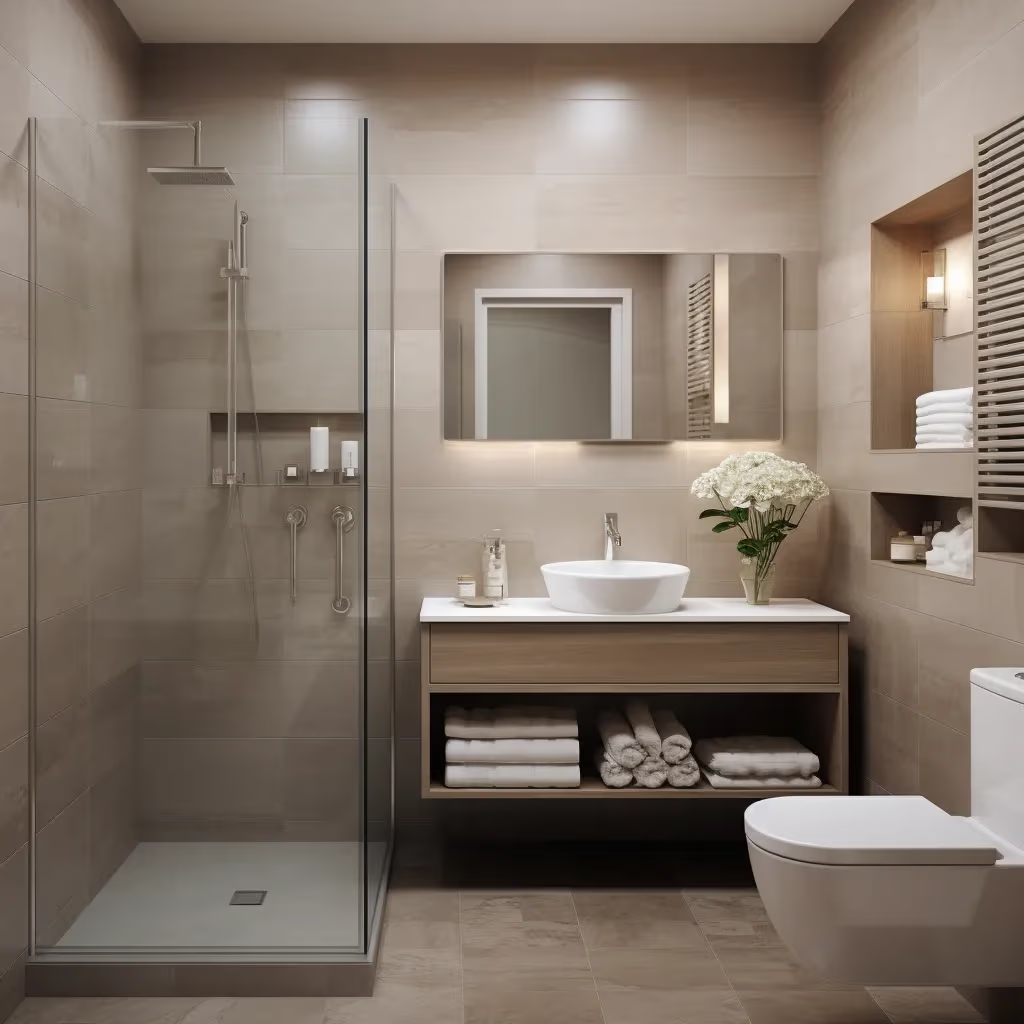As the second most popular type of flooring, aside from ceramic, porcelain tile provides many benefits to property owners. However, you may be wondering, "what is porcelain tile?" Porcelain tile is constructed quite similarly to ceramic tile, as manufacturers use clay and other natural materials to create specifically shaped stones. This particular type of flooring provides homeowners with the opportunity to have a resistant, durable, and reliable floor.
At HOMEfix, we are your expert home remodeling company in Colorado Springs. Our team is here to provide you with the best construction experience for your home. We make installing flooring easy! Plus, we're here to answer your questions about home renovation.
Here's everything you need to know about porcelain tile according to the flooring experts.
What is Porcelain Tile?
Porcelain tile is an elegant and timeless flooring option that has been used for centuries. It is the original ceramic tiling material and is made from a combination of clay, quartz, sand, and feldspar that has been treated at a high temperature.
This process creates one of the most durable surfaces available and it's easy to see why it's so popular. For example, porcelain tiles won't wear away or chip as easily as regular tiles. Plus, its stunning glaze options come in countless shapes and sizes to fit any room feeling you desire — from classic to modern — with natural rustic or glossy finishes found in restaurants, kitchens, bathrooms, and outdoor areas.
Furthermore, porcelain floor tiles are waterproof which makes them ideal for wet environments, such as a pool deck or outside patio without risk of chipping or fading. Even better, they're also low maintenance requiring just a light cleaning every now and then!
What is Porcelain Tile vs. Ceramic Tile?
Porcelain tile and ceramic tile both bring a beautiful dynamic to home décor, but it’s important to understand the differences between them.
Porcelain tile, which is denser than ceramic tile, is made from refined, powdered clay that has been fired at extremely high temperatures. This creates a harder material that is ideal for bathroom walls, outdoor locations, and high-traffic areas because it resists chips, moisture, dust, and bacteria.
Ceramic tile, on the other hand, is usually slightly more affordable and good for lighter usage, such as kitchen backsplashes, since it isn't as strong and may require more frequent floor care. When shopping for a new tile addition to your space, make sure you consider what type of environment the material will be in so you select the best type of tiling option.
Where to Put Porcelain Tile in Your Home
Porcelain flooring is a great way to add a unique touch and beauty to a space in your home. It's especially effective in entryways, bathrooms, kitchens, and dining rooms — anywhere where extra durability is needed.
Porcelain tile comes in an array of styles and colors so you can pick something that will match the rest of your décor. Being moisture and stain-resistant, it is also suitable for areas that may find themselves exposed to water spills, humidity, or other liquid spills, such as the kitchen or bathroom. With porcelain tile flooring, you'll be left with a beautiful floor that will last for decades.
The Benefits of Porcelain Tile
Prior to making your final decision on the type of flooring that you want, you will want to consider the advantages associated with all types of floors. Porcelain tiles in comparison to other flooring are far more advantageous. Here's why!
Durability
The largest benefit associated with porcelain tile flooring is that it's extremely strong and hard, even more than ceramic tile. With that being said, you can rest assured that your tiles won’t experience any wear and tear due to people constantly walking on them. If you have an area of your home that experiences an ample amount of traffic, consider using porcelain tiles. Also, these tiles can be especially beneficial for business properties due to their hardness.
Aesthetically-Pleasing
Porcelain tiles provide homeowners with the opportunity to choose different colors, shapes, and styles of flooring to help match the aesthetic appeal of the rest of their homes. Instead of relying on generic hardwood flooring or carpet, porcelain tiles provide more customization options. Also, they are generally more pleasing to the eye than other types of flooring, such as ceramic tiles or natural stone.
Less Staining
Another large benefit associated with porcelain tile is that it is less porous than other types of floors. Therefore, you won’t experience any staining in the event of spilled drinks, food, or chemicals. Because porcelain tile isn't as porous as others, you don't have to worry as much about water damage. You can see why its waterproof quality is extremely attractive to homeowners!
Simple Maintenance
As a property owner, you are undoubtedly aware of how important it is to keep your floors and your home clean. Porcelain tiles are incredibly simple to clean, as there are an array of different products that can be used to maintain the look of your flooring. If you are not interested in using products, you can simply clean your floor with a damp mop. Porcelain floors do not require any polishing, waxing, or sealing. You won't have to worry about water absorption either, as porcelain tile has durability to water.
How to Choose Porcelain Tile
Shopping for porcelain tile is an exciting but overwhelming task. There are many factors to consider, including grade, class, and style. It is important to understand the differences between these categories in order to make the best decision for your project.
Grade refers to the quality of a tile's body, the surface texture, and whether it has been through additional processes for coloring or glass adhesion.
The class describes what kind of wear resistance a porcelain tile has and its overall durability potential.
Style is about aesthetics — it can influence construction projects, such as bathroom walls, kitchen countertops, and more.
All three of these factors should be taken into consideration before committing to a particular type of porcelain tile. With research and exploration, you can make an informed decision that will provide you with years of satisfaction.
Types of Porcelain Tile
When it comes to porcelain tiles, there are a number of different types available for homeowners to select from. Glazed porcelain tile floor is the most common choice due to its glossy finish and durability. Unglazed porcelain tile is increasing in popularity, and it offers increased slip resistance along with a rustic, natural look.
Additionally, you can find rectified porcelain tile, which has sharp edges that allow for almost invisible grout lines; monocottura (or single firing) tiles, which have a single fire temperature that provides added hardness and durability; and digital printing technology applied to pin-sharp definitions and colors.
Get Expert Porcelain Tile Installation from HOMEfix
Porcelain tile offers unique advantages that make them ideal for different applications in any home or commercial setting. Exploring your options can help you make the best selection for any flooring project.
Installing porcelain tile in your home or business doesn't have to be a tricky process. With help from the pros at HOMEfix, you can rest assured that your installation will be done flawlessly and expertly. From planning and preparation to clean up and maintenance, our team can handle it all. Contact us today to take advantage of our expert home improvement services!

